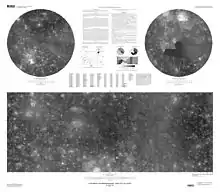 USGS map of Callisto - Created with Isis | |
| Developer(s) | USGS Astrogeology - Flagstaff |
|---|---|
| Initial release | 1971[1][2] |
| Stable release | 3.3.0[3]
/ 11 October 2011 |
| Operating system | Cross-platform |
| License | Public domain software[4] |
| Website | isis |
Integrated Software for Imagers and Spectrometers (Isis) is a specialized software package developed by the USGS to process images and spectra collected by current and past NASA planetary missions sent to Earth's Moon, Mars, Jupiter, Saturn, and other solar system bodies.
History
The history of ISIS began in 1971 at the United States Geological Survey (USGS) in Flagstaff, Arizona.
Isis was developed in 1989, primarily to support the Galileo NIMS instrument.[5][6][7]
It contains standard image processing capabilities (such as image algebra, filters, statistics) for both 2D images and 3D data cubes, as well as mission-specific data processing capabilities and cartographic rendering functions.[8]
Raster data format name
Family of related formats that are used by the USGS Planetary Cartography group to store and distribute planetary imagery data.
See also
References
- ↑ 1971-1980 /PDP-11/DOS-BATCH / Unnamed
- ↑ A working environment for digital planetary data processing and mapping using ISIS and GRASS GIS, Alessandro Frigeri, Trent Hare, Markus Neteler, Angioletta Coradini, Costanzo Federico, Roberto Orosei, Planetary and Space Science 59 (2011) 1265–1272
- ↑ ISIS 3.3.0 RELEASE 2011/10/11
- ↑ PDS Software Detail
- ↑ Gaddis, et al., (1997) LPS XXVIII, pp. 387-388
- ↑ MODERNIZATION OF THE INTEGRATED SOFTWARE FOR IMAGERS, Anderson, J.A., Sides, S.C., Soltesz, D.L., Sucharski, T.L, and Becker, K.J., U.S. Geological Survey, 2255 N Gemini Drive, Flagstaff, AZ, Lunar and Planetary Science XXXV (2004)
- ↑ Modernization of the Integrated Software for Imagers and Spectrometers, 35th Lunar and Planetary Science Conference, March 15–19, 2004, League City, Texas, abstract no.2039 Publication Date: 03/2004
- ↑ USGS Isis Homepage
External links